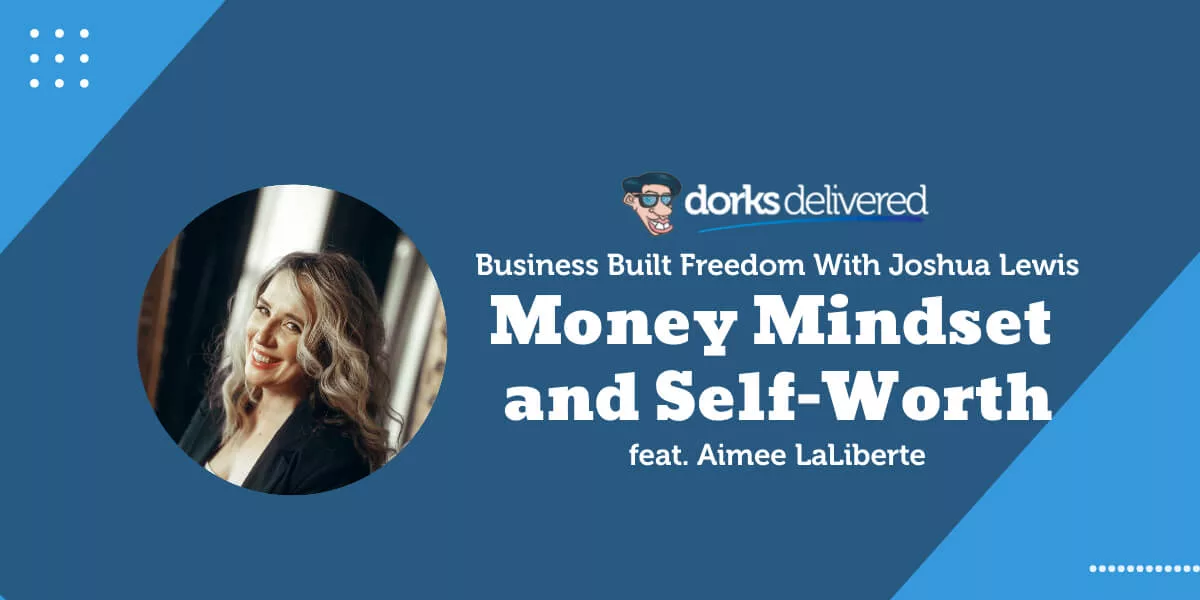We all need money in business to survive, and Aimee LaLiberte from My Virtual CFO joined Josh to talk about what a money mindset is, how to change your money mindset, and making sure that you are healthy with the way that you’re thinking about earning money.
What is a Bad Mindset When It Comes to Money?
A bad money mindset is not having awareness of your thoughts about money, for example, you don’t even take the time to just ask yourself “what do I think about money?” Some people avoid having conversations about money or they avoid looking at the numbers if they’re a business owner because they feel that it’s a reflection of them in some way, shape or form. The truth is it’s not.
Another is not having a relationship and thinking that there is a right and wrong way to have a money relationship and to manage money. There are so many ways that you can manage money, and not doing anything is disempowering.
How to track your money?
I know that some people love the idea of being under pressure and the feeling that they must create the result as if their life depends on it. I don’t subscribe to that mindset. I think there’s super intentionality behind it: “I am going to create all of my needs from this one way of creating money, and I’m going to then leverage this new project or business to do that.”
Understanding how much money you need to have the lifestyle that you need to get started is Step one. And step two is having a proper bookkeeping system or a money management system that can show you what’s coming in and what’s going out. Once you have that data, that’s when you can start answering some of the questions that you posed, like “am I charging enough?” and “do I like my profit margins?”
Are you undercharging?
I’m not a believer in just charging what anybody would pay. Going back to your mindset, if you don’t have the belief and the self-confidence in what you’re charging, they’re going to be able to pick that up on sales calls.
What you want to be able to do with sales is to create value and demonstrate that what you’re offering has tremendous value. When it comes to pricing, if you don’t believe that what you’re charging creates value, then it’s going to be a lot harder.
I’m not saying that you undercharge, but you should find out where you can show up and say that this is the best service that you’re possibly going to get.
Learn How to Calculate Sales Growth Over 5 Years
When you’re able to speak from that level of confidence, people say “Yes!” At some point, you’re going to have more demand than supply, and that’s where you start to introduce the whole
There’s time, there’s convenience and then there’s the price. If you value your time, then you’re going to pay more. If you want time and convenience, you’re going to pay more. Again, this comes back to that awareness of what it is that you want. What do you want to create? It also comes back to understanding your clients.
The business owners who identify the bookkeeping aspect as just a means to an end that they have to get done are not my ideal clients because my goal with my clients is to create and show them how to have a relationship with money. That is not a transactional service. That is a transformative service. It’s a high ticket, and people pay for it because of the value that I’ve created: when they’re able to pay down their debt, have a very positive mindset and can create any money goal that they set in their business, they are thrilled to work with me. It’s beyond bookkeeping.
Money and Self-Worth
Money is neutral. You and I could have a conversation about a million dollars—I can say that is so much money but you can say that is not enough money—and we know that it’s not the number. It’s our thoughts about the number.
When we talk about self-worth, universally, as humans we’re worthy. We’re whole, we were brought onto this planet full of worth. We’re enough, we are always enough and love is always available to us at the core.
We know that because when babies are born, they’re not saying “oh my God, I’m not worthy, I’m not loved.” They’re just doing their thing, and they just want their basic needs filled. And then life starts to happen, and their brain starts to pick up these different signals and messages.
We understand that self-worth is inherent. You’re always worthy. There’s a divide between your observation and your self-awareness of your worth. If you don’t identify yourself as worthy, that’s the work that you need to do with your mind.
What is creating those blocks for you? What circumstances have created those thoughts and you just start poking holes into those thoughts so you can step into your worth?
Your money and your worth are not mutually exclusive. They are completely separate entities. They have nothing to do with one another. You’re always worthy. It doesn’t matter what it says in your bank account, your balance sheet, and your income statement. It doesn’t matter whether you’re making your first dollar in business or you’ve made your latest billion dollars in business.
Turn your IT into a utility! Let technology help you run your business so you can have more time to work on your business.
Is it sensible to manage your numbers yourself?
You should always have a relationship with your business financials. It’s just to what extent. For me, I find that there is a journey.
When you’re just starting out, to have the relationship with numbers, to know the ins and outs because you’re building all the things, and to DIY your business financials and your bookkeeping make sense when you do so with someone who can set it up properly.
I work with clients who are not in a position to outsource on an ongoing basis. They’re the “just set me up and teach me what I need to know in order to achieve my goal” clients, so I create that for them.
As time goes on, as they start making multiple six figures, things start to change, and they are at a position where they need to outsource bookkeeping and need someone in a CFO capacity who can help them be future-focused.
The other thing is we go back. I’m a certified Profit First Professional, and one of the things that I advocate for is implementing Profit First at the very beginning. That is the best time because you haven’t created any habits that are going to be part of the focus when you are further along in business and you’re trying to do the profit—maximise numbers for the real revenue numbers. It’s good that you have that practice.
As you go further along, it might be a hybrid thing. Maybe you’re still doing your bookkeeping, maybe not, but you’re still working with someone like me who can do the bookkeeping, the profit first, the mindset coaching, and the CFO stuff.
At some point, you’re going to get to where you want to completely outsource it, but you still want to have those ongoing conversations with your outsourced CFO in order to understand how the business is going? What do we think is going to happen? What do we project is going to happen and then what actually did happen?
Constantly managing your mindset through that journey is important because every single time your business grows and every single time you make more money, that is another version of yourself that you’re stepping into. The business owner who will create his or her first six figures is not the same business owner who is going to create multiple six figures, and that is not going to be the person who will create the seven-figure business. It all requires the management of the money but with the active practice of your mindset.
From the Profit First standpoint, at minimum, you’re doing Profit First transfers twice a month. That rhythm would just organically have you check on a semi-monthly basis, but I love the idea of going at it weekly because when you see your revenue results and you have your expenses, then you see your bottom line, and let’s say that you have a loss for the week, you can check in with your mind. Is there any sort of resistance? Are you thinking anything of it? If you see those numbers and you have thoughts that aren’t going to serve you, that’s where you really have to do the mindset check-in.
In terms of how you manage it, from a CEO standpoint, it really depends on the rhythm of the business. At a minimum, it should be monthly. If you have a business wherein there are daily sales and there are implications with that, then you can definitely set yourself up to do it daily.
If you have the right software in place, you can create daily reports. But again, when you require the type of service where there’s daily work with the bookkeeping and all of that, it’s going to cost you more money because you need someone leveraging the technology in order to make sure that everything lines up properly.
Whether you’re making your first dollar in business or you’ve been running your business for years now, technology can help you. Ask us how.
Should you share your financials with your staff?
I totally believe in transparency with numbers. What we do is we always provide monthly overhead numbers of a very high level. We have all the different categories in an overarching
larger category. For example, all the teams’ compensation is in “employee compensation” so it doesn’t say how much employee A made, how much employee B made, and so on.
If you have occupancy cost, that’s another category. You should have a category for marketing and advertising, too. From there, we can go all the way down from administrative to finance. It goes case by case based on the business, but you should totally share the overhead numbers because it helps the employees take ownership of their financials, especially if there’s profit-sharing or bonuses involved. They can help you own the numbers so that you can have the maximum profit. Everybody wins.
Whether you need help just once or long term, you can call a dork for reliable IT support.
Money Management System for Business
If you want to learn more, I’m offering a master class on how to create a money management system that works for your business. It is a system or a recipe that lets you walk away from this masterclass with an understanding of how to create that money system. We will also talk about some of the mindset practises that you can do. There’s a lot of action with money management, but the mindset stuff does go very closely intertwined with that.
Have more time in your hands when you turn your IT into a utility. Learn more!
































